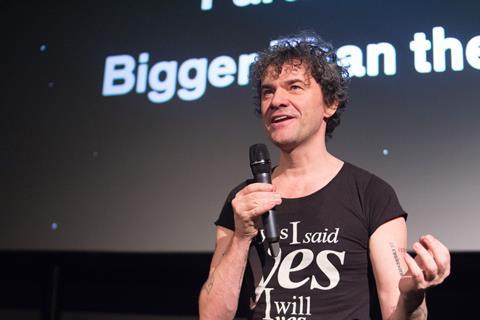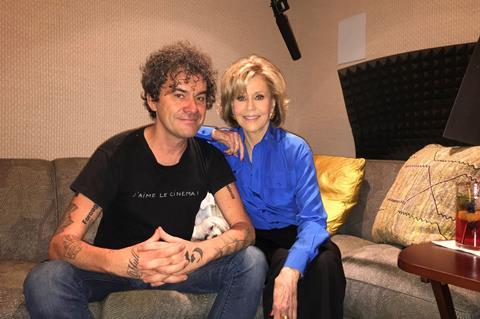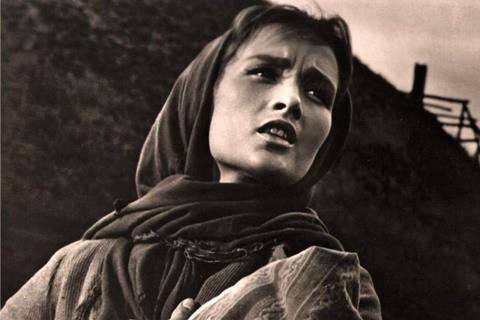UK director Mark Cousins is in Venice Film Festival this year with the first part of his latest documentary Women Make Film: A New Road Movie Through Cinema, an epic look at the history of cinema through the lens of female directors, from Agnès Varda to Binka Zhelyazkova. The first four hours are narrated by Tilda Swinton and, as Screen revealed, the second part will be narrated by Jane Fonda.
“There aren’t nearly enough women filmmakers, there never have been. The film industry is sexist by omission, it’s a boys’ club,” says Swinton when appearing on screening at the beginning of Women Make Film chapter one.

Screen caught up Cousins on the eve of his Venice premiere to discuss the making of the project, which was done under the radar by a passionate team, and to ask the burning question that many have posited since the film was unveiled – should it have been directed by a woman?
Tell me a bit about the origins of the project, when you started working on it and why?
For nearly 20 years, when I’ve met an expert on, say, Finnish or Sri Lankan film, or when I’ve visited film archives in China, Albania, or Hong Kong, or when I’ve emailed archivists in Bulgaria, Romania or Mexico, I’ve asked the same question: who are your women directors?
I knew the famous names, but built up a list of many more. I saw a Malvina Ursianu film which is as good as Ingmar Bergman. I became obsessed by the fact that Astrid Henning-Jensen’s beautiful movies were hard to show.
I talked to producers John Archer and Clara Glynn, and we decided just to start making an open-ended film about these great movies that have been sequestered. We weren’t commissioned, we have no financial supporters. We worked outside the system, for years.

In the context of the ongoing debate about gender equality in the film industry – and Venice‘s inclusion of only one female filmmaker in its Competition line-up – what impact can this film’s premiere in Venice have?
We want it to be an eye opener - Women Make Film’s working title was Eye Opener. We want it to help us see film anew. We started making it way before the current, long overdue, challenge to male dominance in cinema.
To be honest, the film wants to plant a bomb under the canon. It wants to shift the focus onto great filmmakers who have been forgotten or underappreciated. It passionately believes that cinema is androgynous, and that the male dominance in film production and direction has constrained this great art form. Women Make Film shows that women have made every type of film. Our movie is a thank you to them.
What do you want this film to achieve?
It’s an exhortation, in a way. The original title was Women Making Films, but Tilda Swinton changed it to Women Make Film, as if there’s a comma after the first word, and an exclamation mark after the third, like this: Women, Make Film! We liked this call to arms feel, as if the movie is a recruiting campaign. But just as much, it’s a celebration of great films, some of which we know, many we don’t. We want to excite and delight people in the dark, people of all genders.
What do you make of Venice chief Alberto Barbera’s comments that “You can’t change things from the outcome, they have to change from the start”, i.e. that his festival is not to blame for a lack of representation, and rather it stems from a wider industry problem?
Most aspects of the film industry share some blame for the side-lining of women. Most organisations, including the Venice Film Festival, could have done more, earlier.
We point the finger in particular at those who did retrospectives, national surveys and film seasons without even noticing that they included no films directed by women. This unconscious bias has perpetuated the false history of cinema, in which women are underrepresented, for years.
Alberto Barbera is correct in implying that the revolution in attitudes and decision making must happen up stream, where content is chosen and directors are hired.

How do we encourage more female filmmakers to enter the industry? How do we enable them with opportunities?
A total change in mentality is needed. This change has begun. There’s nothing intrinsically male about movies, and as film historian and associate producer of Women Make Film, Cari Beauchamp has shown, it was the money men who made cinema male dominated.
We need far more women choosing content and hiring directors (though not all powerful women in film studios have hired other women). We need to call out exclusion and change our sense of what sort of art and entertainment form cinema is.
When the film was announced, you likened the project to “a film school, where all the teachers are female” – considering this, is it controversial that the film is directed by a man?
Yes, it’s noticeable that this film is directed by a man. Most of Women Make Film’s producers are women, its sound designer is a women, its composer, graphic designer, voice artists, sales people and PR people are women, but yes I’m a man.
I’m one of many voices in the movement for change in cinema. Some of the other voices we admire include the historian Cari Beauchamp, Barbara Ann O’Leary at Directed By Women, Women in Film, Gaylene Gould, Anna Bogutskaya and others at the BFI, Lizelle Bischoff, and before this Annette Kuhn, Claire Johnston, Lynda Myles, Iris Barry at MoMA and many others.
Together we have been researching and challenging conventional opinion. I hope I’ve earned my place in this movement because, for two decades - in my films, books, Sight & Sound columns, programming, teaching and twitter feed - I’ve been one of those researchers, one of those questioners, one of those calling out film programmes and retrospectives which overlook movies directed by women.
To be honest, I’ve become one of the experts in this field, and in the era of Trump and Michael Gove, when experts are derided, we need as many as we can get, with many different perspectives.
Do you think this film could have been made by a woman? If yes, what barriers are in place that have stopped that from happening?
A film about the great movies directed by woman could have been made by any film lover with a passion for the subject, curiosity, knowledge and the degree of anger that is needed to sustain the years of work. We’ve made it so far entirely with our own money. No one commissioned it. We didn’t ask for a green light. We went on red.
But Women Make Film is our own take on a vast subject. Other filmmakers might have made it more about the lives of the directors, or the film industries in which they worked. Ours is solely focused on the work, the films, the scenes.
Most female filmmakers I know say that they don’t particularly want to be seen as a woman director, they just want to be a director. Our film totally accepts that. We think it is a big contribution to cinephilia, but other directors would look at the subject in a very different way - which is the brilliance of movies.
You also worked in festivals before - how important are festivals in the overall film ecosystem?
Festivals exist because of market failure. They should be a j’accuse to the film industry, they should be its R&D wing, its conscience. At their best, festivals remind us why we’re in film in the first place. They should cut through the crap of film.
What’s up next for you?
I’ll complete Women Make Film, and do publicity for my book The Story Of Looking when it comes out in other countries. I did three films this year, so I need to take time off and swim in Scottish lochs.

























No comments yet